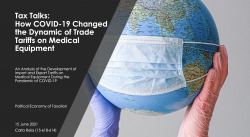The Twentieth Century revealed that countries with similar economic development like South Africa and Brazil have significant differences in taxing personal income ranging from 4% in Brazil to almost 16% (% GDP) in South Africa by the end of the century. In his predominant cross-country comparison Evan S. Liebermann argued that the National Political Community was ultimately responsible for the differences in the development of income policies. Within the three volumes of Podcast’s I will elaborate and discuss the National Political Communities and Income Taxation in both countries in the twenty first century and provide meaningful insights from Tax specialist.
Category: Indirect Taxation
The Tampon Tax

The tampon tax has become an on-going discussing topic. Support to repeal this tax has increased in the last years, with activists arguing that menstrual hygiene products should be classified as tax-exempt necessities, alongside other items such as food, tap water and medicine. This issue pertains to gender equality, affordability and women’s health. While the large majority of the countries around the world still tax menstrual hygiene products as non-essential goods, some countries are starting to lift or reduce the tax. In 2004, Kenya became a trailblazer when it was the first country in the world to repeal the tampon tax. Listen to this podcast to learn more on the topic, by discovering both sides of the argument, and understanding the implications following an amendment of the tax.
Tax Talks: How COVID-19 Changed the Dynamics of Trade Tariffs Medical Equipment

COVID-19 has changed the dynamics of how our world functions today. Wearing masks has become the new “normal” and could be considered a mandatory accessory. However, how did states manage to make medical products available on a large scale? This podcasts discusses how COVID-19 has changed trade and tariffs of medical supplies and how this can have an impact on medical care.
The Real Estate Acquisition Tax in Czechia
Podcast on the Abolishment of the Real Estate Acquisition Tax in the Czech Republic by Martin Husek
VAT evasion in Italy – Beeler Valentina
Bibliography Allingham, G., & Sandmo, A. Income Tax Evasion: A Theoretical Analysis. Journal of Public Economics 1, no. 3- 4, Nov. 1972, pp. 323–338. doi: 10.1016/0047-2727(72)90010-2 Brosio, G., Cassone, A. & Ricciuti, R. Tax Evasion Across Italy: Rational Noncompliance or Inadequate Civic Concern?. Public Choice 112, 259–273 (2002). doi: 10.1023/A:1019985022106 Chiarini B., Marzano E., & Schneider, F. Tax rates and tax evasion: an empirical analysis of the long-run aspects in Italy. Eur J Law Econ […]
Trade Liberalization and VAT Reforms in Developing Countries
While being a primary source of income for many developing and transitional countries, trade taxes such as tariffs arguably discourage the welfare-enhancing activity that international trade has been shown to be. Therefore, developing countries had been recommended to reduce the barriers to trade and open up their economies. The value-added tax, VAT, was key in the attempt to recoup the revenues lost in developing countries. But to what extent has the VAT actually been successful in doing so? Judging from the experience of developing countries, what factors make a successful substitution of trade revenues through VAT more likely? And what elements can account for the failure of VAT tax reform in a country such as Bangladesh?
The Window Tax – indirect taxes, tax avoidance, and architecture

Many homes with bricked up windows represent integral icons in British towns and cities. Why so? In this podcast, we dive back into history to discover the Window Tax, that was in effect for more than 150 years up until 1851. We shall explore why such a tax came about; what its intended and unintended consequences were, and what role it had in revenue collection for the Crown, alongside other indirect taxes. Finally, we shall take a look at how tax avoidance behavior has left a permanent and observable mark on architecture across the world. This is a story of incredible ingenuity on the part of Englishmen in asserting their liberties against parliament by exploiting loopholes in legislation to free themselves from the burdens of taxation.
Recent Comments